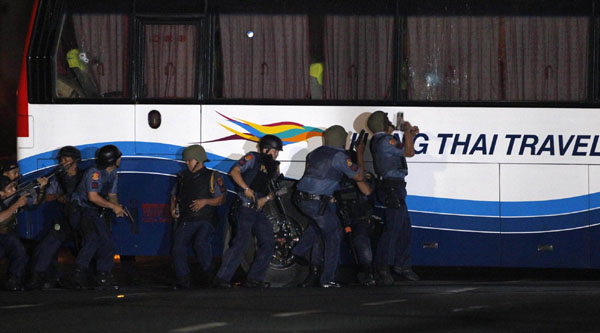Asia-Pacific
Gunman, 9 hostages killed in Manila bus siege
(Agencies)
Updated: 2010-08-24 07:23
 |
Large Medium Small |
 |
|
Police commandos surround a bus with tourists being held hostage at Quirino Grandstand in Manila August 23, 2010. [Photo/Agencies] |
MANILA - Philippine police shot dead a sacked former policeman as they stormed a bus on which he was holding 15 Hong Kong tourists hostage in central Manila on Monday. Nine hostages died as of Tuesday noon.
The gunman, identified as 55-year-old ex-police captain Rolando Mendoza who was armed with an M-16 assault rifle, had stopped the bus, which initially had 25 people on board, on a wide road in Manila's biggest park in the morning.
"The hostage-taker was killed. He chose to shoot it out with our men," police Colonel Nelson Yabut told reporters.
"On our first assault, Captain Mendoza was sprawled in the middle of the aisle and shot one of our operatives. On our second assault we killed him."
Yabut said a woman was seen moving at the back of the bus during the first attempt, and on the second assault the 30 commandos had used tear gas and flash bombs. Mendoza moved to the bus door, where snipers shot him, Yabut said.
"We did everything to negotiate and end this peacefully, but he gave us no choice," he said.
Police could be seen removing a body from the front of the bus before entering the vehicle and minutes later a number of hostages were helped off the bus.
Philippine Health Secretary Enrique Ona said eight hostages had died. Earlier, China's Foreign Ministry said seven Hong Kong residents were killed, two severely wounded and the remaining six hospitalised in the tragedy.
Philippine President Benigno Aquino III told a midnight news conference that negotiators had thought the situation would be resolved peacefully, and the hostage taker did not appear set on hurting others or himself.
"Unfortunately that changed, and it changed quite rapidly," he said, adding there would be an investigation into what caused the situation to deteriorate, including the role of the media.
"How can I be satisfied when there are people who died?"
Series of shots
The end of the day-long drama came more than an hour after police commandos had first moved in to break windows and surround the bus following a series of shots.
The driver of the bus was seen running to safety after the first flurry of gunshots.
One hostage who survived told Hong Kong reporters her husband had sacrificed himself by charging the gunman to try to stop him from killing others.
"The bullets were flying everywhere, I thought I was going to die," the woman said. "It was too late, why did we have to wait so many hours before somebody came to help us?"
Mendoza had threatened to kill the hostages in a live telephone interview with a local radio station.
"I can see there are many SWAT teams arriving, they are all around," Mendoza, speaking in Tagalog, had said. "I know they will kill me, I'm telling them to leave because anytime I will do the same here."
For much of the day the gunman had appeared to be negotiating calmly with police, organising food and fuel for the air-conditioning. Nine hostages, six Hong Kongers and three Filipinos, mostly women and children, had been released in stages.
Mendoza's brother, Gregorio, told a local TV station that his brother was upset by his dismissal from the force. Local media said he had been sacked for reasons including extortion, and due to his sacking he had lost his retirement benefits.
"His problem was he was unjustly removed from service. There was no due process, no hearing, no complaint," said Gregorio, who was later taken into custody by police shortly before the situation deteriorated.
Stuck to the bus door was a piece of paper with the handwritten message: "BIG MISTAKE TO CORRECT. A BIG WRONG DECISION".
The tragedy played out in front of the Quirino Grandstand, where less than two months ago Aquino had taken his presidential oath.




